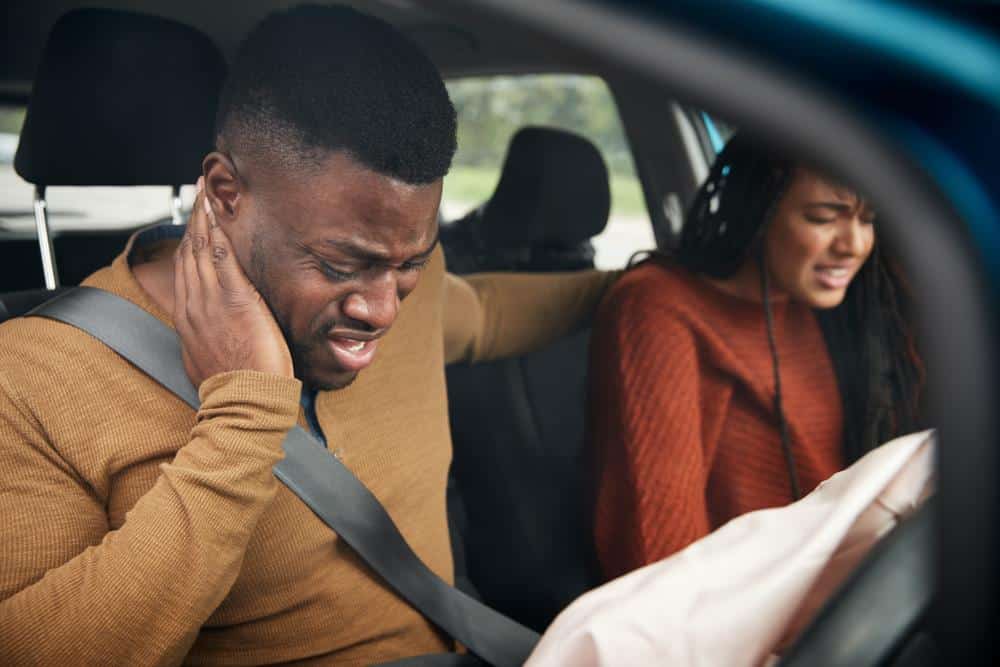If I Was a Passenger in an Accident, Can I Sue?

When discussing the legal ramifications of a car accident, we tend to focus on the drivers’ rights. That is understandable since one of them will likely be considered the negligent party. However, we should not overlook the rights of the passengers involved in those accidents.
While the two drivers involved in the crash may have already settled their affairs, the passengers may still seek financial compensation for their losses. So, what are your rights as a passenger involved in a car crash? Can you sue the driver responsible for what happened?
Those are the questions we will be answering in this article. Stay tuned and learn more about your rights as a passenger in a car accident.
What Are My Rights as a Passenger in Maryland?
Maryland law requires motorists to take out insurance policies on their vehicles. More specifically, drivers in the state of Maryland must purchase a policy that provides $30,000 in bodily injury coverage for one person and at least $60,000 per accident. The policy should include $15,000 in property damage coverage.
We should note that the protections included in a standard auto insurance policy cover more than the drivers involved. They account for anyone who sustained losses due to the accident. That means passengers are indeed covered by insurance.
Passengers are entitled to take legal action if they sustained injuries following a collision. They can go after the driver who caused the accident and seek compensation for their losses. If your claims are valid, the negligent driver’s insurance must offer you a payout. The negligent motorist may even be forced to cover your losses using their policy.
What if the Driver Who Caused the Accident Is a Family Member or Friend?
Taking legal action against the driver who caused your accident is a must. Ordinarily, moving forward with a lawsuit following an accident is not something people struggle with. They may hesitate because they are wary of a potential legal battle, but their need for compensation supersedes that concern.
The situation becomes more complicated if the investigation reveals that the negligent party is the family member or friend you were riding with. You may find yourself stuck between a rock and a hard place because you need to pay your bills somehow, but you do not want to jeopardize your relationship with your loved one.
Faced with that dilemma, it helps to remember that you are first seeking compensation from your loved one’s insurer. You are not taking money out of their pocket because the insurance company is obligated to cover the payout.
Furthermore, you don’t have to deal with this matter personally. Hire a car accident lawyer and let them handle the negotiations with your loved one and their insurer. Regardless of how you handle this matter, you do not need to feel bad about pursuing the compensation you deserve.
Liability and Proving Negligence
Whether you are suing a stranger or a loved one following your accident, you must be able to prove that they were negligent. You cannot recoup compensation without establishing the presence of negligence in your case.
So, how should you prove that the driver should be held liable for your losses? According to the Legal Information Institute, plaintiffs are typically required to demonstrate the presence of five specific elements to make a successful negligence claim. Let’s go over each of those elements in detail.
The Defendant’s Duty of Care
Proving that the driver owed you a duty of care is rather easy in a car accident case. If the driver invited you or you asked to be their passenger, and they obliged, they must keep you safe for the duration of the drive.
The driver may only be able to put a legitimate argument against this point if you rode in the vehicle without their permission. Perhaps you snuck into the backseat and hid yourself. If an accident occurs while you are hiding, the driver may argue that they owe you nothing because you were not supposed to be in the vehicle in the first place.
The Breach of Duty of Care
Now that we know the defendant’s duty of care, we can understand what it means to breach that obligation. Breaching duty of care essentially means that the defendant acted in such a way that led to the plaintiff’s injuries. The act in question may be something the driver did or something they failed to do.
An example of this would be swerving back and forth between lanes and then getting into an accident. The driver is not supposed to behave that way. Their failure to control their vehicle properly is the breach we are talking about.
To counter an accusation they were being negligent, the driver may claim that they maneuvered their vehicle to prevent a more serious accident. Things can get tricky here because the driver may say they were swerving to avoid another car. You and your lawyer must examine the facts of the case closely to determine if that claim is true. If it is, you may need to sue a different driver.
The Plaintiff’s Injuries
Next, you must detail the injuries you sustained from the car accident.
These injuries account for more than the physical harm you sustained from the crash. Your losses may also include the medical bills you have had to pay out of pocket. The injuries we are discussing here may also refer to your damaged property. You could sue the negligent driver for damages if the accident destroyed your expensive laptop.
Injuries may also come in the form of lost wages—request compensation for the wages you missed because you were too injured to work.
In some cases, a plaintiff’s injuries may include pain and suffering. Plaintiffs may put this claim forward if the accident has left them traumatized or disfigured. You can also make this claim if a loved one who was in the vehicle with you at the time of the accident died due to their injuries.
The Proximate Cause
When discussing the presence of proximate cause in a car accident case, we need to consider if the defendant should have foreseen that their actions could have led to a crash.
If the accident occurred after the driver ran a red light, they should have known that following through with such a reckless action could have dire consequences. That means the proximate cause is present in the case, and the driver could be on the hook for the plaintiff’s losses.
The Actual Cause
Last but not least, the plaintiff must prove the element of the actual cause, otherwise known as cause-in-fact, in their car accident case. To prove actual cause, you must establish the link between the driver’s actions and your injuries. You can point out that the driver’s negligent behavior is why you have a broken leg.
With that final element in place, you can present a solid case to the court and the other side. The insurance company may have no choice but to settle your case or risk a trial with little chance of success.
What Can Make These Claims Complicated
From your perspective, your car accident claim may seem fairly straightforward. You were riding in a car when an accident occurred and want to hold the driver responsible.
Unfortunately, claims like these rarely play out in a straightforward manner. Different factors may come into play, and they could jeopardize your claim, fairly or not. Let’s use this opportunity to highlight those factors so you can recognize the threat they pose to your claim.
False Accusations
The negligent driver and insurer involved in your case may not be too keen to give you the compensation you’re asking for. Instead of covering your damages, they may argue that you are simply faking your injuries. They could also claim that your possessions were damaged before the car accident.
You will be frustrated at the sheer absurdity of those false accusations. You and your attorney will provide proof to refute each of those false accusations and prove to the court that you sustained legitimate injuries and property damage.
Contributory Negligence
Maryland follows the rule of contributory negligence when handling personal injury lawsuits. For those unfamiliar with contributory negligence, it is a rule that prevents a plaintiff from recovering damages if they bear fault for the accident. Contributory negligence can stop a plaintiff from receiving compensation even if they share a measly 1% of the blame for what happened.
Given how favorable contributory negligence is for defendants, you cannot be surprised if the negligent driver in your case tries to take advantage of it. They may put forth more false accusations, claiming that you distracted them in the moments before the crash, hence why they lost control of the vehicle. The driver may even accept most of the blame for the accident if they pin some fault on you.
Do not fall victim to the trap of false contributory negligence claims. Let your lawyer counter those claims to retain your right to recover damages.
Insurance Fraud Accusations
There is one more complicating factor we want to discuss here, and it may emerge if you are suing a friend or family member’s insurer so you can cover your bills. This time, the insurer may not only go after you and claim you are faking an injury. Instead, they may suggest that you and the negligent driver are conspiring to commit insurance fraud.
The insurer may refuse to fulfill their financial obligations, claiming that you and the driver worked together to cause a minor accident, so they will be forced to pay. Insurers may try this tactic as a last-ditch effort to derail your claim. You should disprove it easily with the help of an experienced lawyer.
Do Not Let the Insurance Companies Take Advantage of You
Upon reviewing your claim and evidence, the other party and their insurer may concede that you deserve compensation. They may even call you out of the blue with a settlement offer. On the other end of the line, the insurer’s representative may apologize for only making this offer now because you should have received a payout already.
Since your medical and repair bills are starting to pile up, you may be tempted to accept this settlement offer. In all likelihood, that would be a mistake.
The insurer’s main objective is likely to provide the lowest compensation. They may have concluded that offering you a quick payout now is the easiest way to reduce their financial obligations.
After accepting their offer and signing the paperwork, you will be paid. However, it may be insignificant in comparison to what you could have received if you had waited a little longer. The payment may not even cover all of your medical expenses.
Negotiating with an insurance company on your own is never a good idea. This is when a personal injury attorney can truly help. Your lawyer will field the calls and relay the insurer’s offers to you.
They can evaluate the proposal and tell you if it is a fair payout based on your losses. Your lawyer can continue negotiating until the insurer actually presents a fair offer. If they refuse to do so, you can still go to trial.
Experienced Auto Accident Attorney in Baltimore, MD
If you’ve been in a car accident as a passenger, make your first call to Attorney John Leppler. With his vast experience in Baltimore’s auto accident cases, he’s well-equipped to get the best results for you.
John is always there for his clients, no matter the time or day. So don’t hesitate, contact us at Leppler Injury Law today. Allow John to steer your case towards a successful resolution. Get started right away with our expert legal support and take the first step towards peace of mind.
